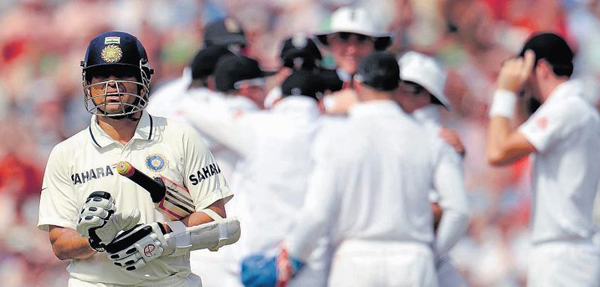
Nagpur, December 19: At present, no one would like to be Sachin Tendulkar. Runs once came in torrents, now the flow has been reduced to a trickle. He hasn’t scored a Test hundred since that magnificent 146 at Cape Town against South Africa on January 4, 2011. And at 39, pressure is on him to bring curtains on a career that is now in its 23rd year.
It’s a difficult situation. For well over two decades, Tendulkar has just played cricket, and that sport has been his world. It’s quite tough to cut ties with that world in a single day, especially for a batsman like Tendulkar, who has been on top of his trade for a larger part of that period. Despite a prolonged barren run, there will always be the image of another golden series in his mind, and that’s precisely the dilemma he has to deal with.
And only he can deal with it. Only he can tell with surety whether the current lean patch is the indication of a terminal decline or is it only a phase that he is struggling for runs. For that he needs to take some time away from the hullabaloo around him, and reflect on the last two series – against New Zealand and England. Meanwhile, let’s go through those series as well.
A young set of Kiwi pace bowlers – Tim Southee, Trent Boult and Doug Bracewell – managed to sneak through his defence three times, and it was quite a sad sight to see him losing the battle against players who were just making their entry into this world when the Mumbaikar made his Test debut.
England bowlers had a far greater hold on him. Though he made a fifty in the first innings of the Kolkata Test, that 76 was more like a desperate effort to keep himself afloat. On that day, he took 43 balls to reach double figures on a flat pitch. There was no life in that innings, struggling to put away even rank long-hops.
He never tamed Monty Panesar or James Anderson throughout the series. Tendulkar never could assess Panesar’s length correctly, often leaving him in no-man’s land or playing those nothing shots. Anderson troubled him to no extent with reverse swing, and England captain Alastair Cook was wise enough to employ these two bowlers immediately after Tendulkar’s arrival at the crease.
In that 76, there was just two fours in front of the wicket – a cover drive off Panesar and a punch through mid-on off Steven Finn. Rest of the 11 fours came through edges, paddle sweeps and squirts through the fine leg area, an indication of his hesitancy to go forward on pitches that demanded such a strategy.
That tentativeness has been the common feature of his outings against New Zealand and England. Now, Tendulkar needs to rewind those outings in his mind, and deliberate whether there’s a return for him as he had managed five years ago, scoring runs and hundreds in a bulk.
There’s another home series coming against Australia in February, and India embark on a slew of away tours, beginning with their trip to South Africa in November 2013. Tendulkar should ponder whether he would able to stand the rigours and contribute in those series. Emotions are certain to flood him during those hours because cricket has been such a massive part of his life.
Here, he needs to compartmentalise himself from sentiments, and prudence should rule his decision. There might not be a man-to-man replacement for him, and then you’ll never be able to replace a player like Tendulkar for he is a phenomenon.
But we need to trust the likes of Ajinkya Rahane, Manoj Tiwary, Cheteshwer Pujara, and Virat Kohli to take India forward, and the last two have already shown their readiness to shoulder that responsibility. In sports, only teams ready to take that bold plunge have attained greatness.
Mahendra Singh Dhoni had underlined that point. “If you don’t give youngsters chances, how do you know whether they are good enough or not? You won’t get all of them scoring big hundreds in the first game. You have to back youngsters who you think are very talented, who you think can succeed at the top level,” said the Indian skipper.
In the same breath Dhoni, in tune with the entire team’s desire, hoped Tendulkar would be around for some more time. Yes, Tendulkar’s extraordinary career, in a major part of which he carried the expectations of a billion people without any complaint, deserves a grand farewell. But he needs to chart it well.






Comments
Add new comment